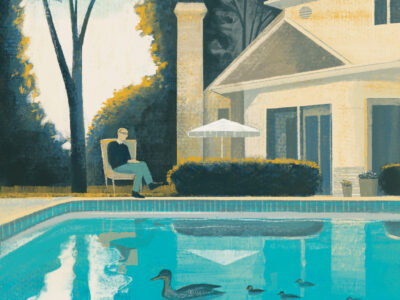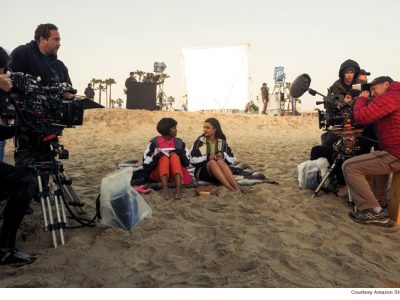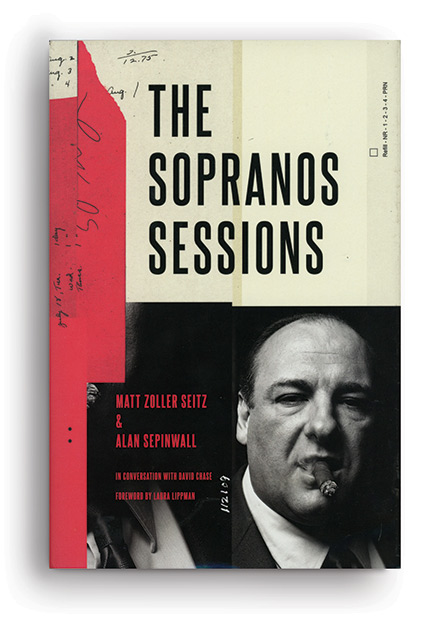
Class of ’83 | The first days of May are Mylanta time in the TV-producing world. Alan Kirschenbaum W’83 has consumed his share over the years, sometimes with nothing to show for it. But sometimes …
This spring, CBS green-lighted his sitcom pilot, Friend Me. It was one of just eight comedy pilots that CBS gave the go-ahead to shoot. But rumor had it that the network only needed one new sitcom for the fall of 2012, and maybe one or two warming up in the bullpen should one of the starters unravel. So the odds were still not exactly in his favor.
Consider how far Friend Me had already come, though. Two years ago Kirschenbaum and his producing partner, Ajay Sahgal, tried to interest networks in the show—a story about two Odd Couple-like buddies who move to California from Bloomington, Indiana, to work for a tech company. No one bought their pitch.
They decided to write it up anyway as a script, and CBS took a preliminary flyer on it—one of 70 pilot scripts that made the first cut. Now it was down to eight.
“I went to Wharton and my statistics class would have told me, randomly, that is a 12-and-a-half percent chance,” says Kirschenbaum. “But nothing is ever random in Hollywood. There is always a tremendous amount of luck and timing. If you write the right script for the right network with the right cast in the right year—well, it’s happened for me before, and I have to always have the hope it will happen again.
“It is emotionally gut-wrenching,” he admits. “You think as you get older and have been through the mill, it would get easier, but it never gets emotionally easier. It’s kind of like musical chairs—the day comes when the network has to make its decision, and if you have the arrow pointing up, you have a seat. And that seat is quite wonderful.”
The decision came four months ago, when Kirschenbaum got another call from CBS. To some, it might have sounded a little cryptic.
“They said we could go ahead and make offers to writers, which was basically an unofficial pick-up,” says Kirschenbaum. The network did not invite him to come from LA to New York for the official ceremony, since Friend Me was a mid-season replacement, “but we got the same 12-episode commitment a fall show would get.”
Given that All in the Family started in January, and Seinfeld had two starts—one in May and the second, more successful one, in January—Kirschenbaum wasn’t complaining about the timing.
“After 25 years of doing this, I only have two professional emotions left, dread and relief, so that day was relief,” he says drily. “My joy is more tempered by dread of actually having to do the shows. It’s a gargantuan task to do a TV show, and we desperately want to do them. So then you get the show and, well, it’s ‘Oh, my god, we have to do them.’
“It’s funny that way.”
Kirschenbaum comes by his comic outlook honestly. His father, Freddie Roman (né Fred Kirschenbaum), is one of the undisputed kings of Borscht Belt and Las Vegas comedy as well as the longtime dean of the Friars Club, the Manhattan restaurant and meetinghouse of comics, theater types, and moguls. Roman’s grandfather owned the Crystal Springs Hotel in the Catskills, where Roman started telling jokes at age 15.
The Kirschenbaum/Roman household was an entertaining one in every sense of the word.
“My mother and father were very social and loved to have people over,” says Alan. Regular guests included such marquee names of New York stand-up as Morty Gunty, Corbett Monica, Jan Murray, and Myron Cohen. “My father never made me go to sleep early. I sat at the dinner table and in the living room and learned the rhythms of comedy. Maybe if I were the son of a musician, I would have learned that, but this was the music of comedy, and I guess I drank it in.”
Roman loved having his son hang out with his friends, and though Alan never became a stand-up, Roman knows he got an early PhD in storytelling.
“Especially Jan Murray,” Roman recalls. “He didn’t tell jokes, but his stories were just amazing. You would just pee in your pants—so that’s what Alan learned. Alan’s strength is that he knows how to tell a story, which is really what a sitcom is.” (Roman made an appearance in one of his son’s sitcoms, the short-lived Stark Raving Mad, essentially playing himself at the Friars Club with two old-time comic friends, Jackie Gale and Jack Carter.)
During his Penn years it looked as though Alan would pursue another passion: harness racing. While some of his friends took on restaurant, research, or retail jobs to make a little side cash, he shlepped up to Liberty Bell Race Track in Northeast Philadelphia several mornings a week to train and drive harness horses—up there by 6:30 a.m. and back in time for 9:30 classes.
Kirschenbaum did do some theater at Penn, but somehow got the oddball parts, says Lew Schneider C’83, now also a TV sitcom writer, then a budding stand-up comic.
“I remember us doing A Funny Thing Happened on the Way to the Forum and Alan just looked too old for anything, so they gave him the Buster Keaton part,” recalls Schneider. “He was old before his time, and now at 51 he has finally grown into his age.”
After graduation Kirschenbaum gave the harness business a try at the Meadowlands, but eventually, he says, “I relented and went into my dad’s business,” adding: “Classmates at Wharton did the same thing, I guess, but theirs was Goldman Sachs.”
He started writing for Dear John, a sitcom starring Judd Hirsch as a mild-mannered schoolteacher dumped by his wife. A few years later, he got his big break, selling Down the Shore to Fox. The show’s premise was that three goofy guys and three snooty girls got to the last summer rental house in Belmar, New Jersey, at the same time, and warily chose to share it. Kirschenbaum made Schneider the star and Belmar native Tom McGowan another of the guys, and hired his high-school buddy Phil Rosenthal to help write.
“In a way, it was the time of my life,” says Kirschenbaum, “because the stories came from my life, and we had such a good time.”
Down the Shore lasted two seasons and 29 episodes—not bad, but not Seinfeld either. Still, it made Kirschenbaum a commodity in Hollywood. He was serious about his work, dependable, and funny—at least on the script-writing side.
“I remember Alan trying stand-up once,” recalls his father. “He went to an open-mike night in Madison, Wisconsin, and called me the next day—‘I’m never doing that again, Dad,’ he said. But as a writer, he just knows how to do it.”
According to Alix Jaffe C’92, vice president of current programs at CBS, Kirschenbaum is known in the sitcom world as one of the rare writers who can really command a story line, not just have jokes in a script. Jaffe was the executive in charge of Yes, Dear—which revolves around two couples who are friends but have completely different ideas about how to raise kids and conduct a marriage—which Kirschenbaum created and executive-produced with Greg Garcia.
“He was actually teaching me about how to do a story, and about how to be a boss,” says Jaffe. “He is no-nonsense and at the same time generous with writers and actors. He goes to work to make the shows as good and as funny as they can be, but he knows that takes work. It’s hard to be funny 26 times a year.”
The success of Yes, Dear is emblematic of what happens in the TV sitcom world. Kirschenbaum and Garcia came up with the idea, and had feelers from both CBS and ABC about making a pilot. They took a shot with CBS because they saw that the slot between Everyone Loves Raymond and King of Queens was probably going to be available.
“That meant they would be looking for a couples kind of comedy,” says Kirschenbaum, “so we took that shot, and, luckily, won.”
When he has not had his own show to run, Kirschenbaum has been a writer and consultant. Rosenthal, who ended up creating Everybody Loves Raymond, repaid his friend’s early confidence in him with writing gigs for Raymond, and Kirschenbaum has been a consulting producer for Garcia’s latest hit, Raising Hope.
In fact, Kirschenbaum and his contemporaries have created a mini-Friars Club of their own out of Victor’s Delicatessen, which he and Rosenthal “discovered” soon after they arrived in Hollywood. Back then it was new, cheap, and around the corner from Kirschenbaum’s apartment, where Rosenthal was sleeping on the couch; now it’s legendary in the LA comedy-writer community for Sunday brunch-and-laughs.
Kirschenbaum never had the ambition to write Death of a Salesman—just to be the best sitcom writer out there.
“The best sitcoms are touchstones of their eras,” he says. “Mary Tyler Moore came just as young women were feeling their way in the men’s work world. All in the Family—nothing was better timing than that. Today, maybe it’s Modern Family. Despite what some politicians might say, that’s the way America actually looks in 2012.”
He has clearly been successful, and happy with that.
“I am past the sexy-and-exciting stage—though I don’t think I was really ever sexy and exciting—and into the dependable-and-happy-to-work-with-him phase,” he says. But, he adds: “As long as you have at least a shot at seeing your name after the Created By title, this is a pretty good life.”
—Robert Strauss




